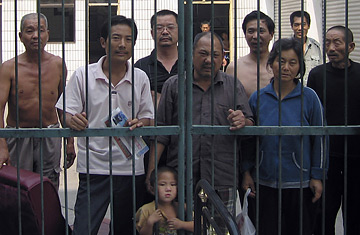
Detained petitioners stand behind prison gates at Nanyang city's office on the outskirts of Beijing, September 10, 2007.
In Beijing, the security forces behave according to the seasons and the calendar. Every spring, for example, they get very, very uptight. That's the time of year preceding the annual meeting of what is often described as China's legislature, the National People's Congress. As a result, dissidents are harassed and detained and hundreds of desperate petitioners — people who have come to the capital to seek redress for an unresolved injustice — are rounded up and forcibly sent back to their home provinces.
Li Heping is well aware of these seasonal crackdowns. As a prominent human rights lawyer, he is far more familiar than most Chinese with the way the country's authorities ensure that "troublemakers" don't interrupt the Communist Party's carefully managed productions. But as he walked to his car after leaving his law office on September 29, Li had little idea he was about to get a firsthand demonstration of how jumpy the police can be. It may not be spring, but something else was on the calendar.
Indeed, on the schedule is the biggest political meeting of them all: the October 15 opening of the Communist Party National Conference. As far as China's political world is concerned, this event, which takes place once every five years, is like the World Series, Super Bowl and Olympics all rolled into one. Policy is decided for the next five years, top jobs are handed out, the losers get dumped and the winners glow.
But though Li was handling a number of politically sensitive cases, there was nothing unusual in his case load, nothing directly connected to the Party Congress. So when a dozen or so men surrounded him, pulled a bag over his head and dragged him into a car, Li's reaction was more surprise than anything else. That would soon change. The men took Li to a house in the suburbs, stripped him to his underpants and beat him and poked him with an electric cattle prod.
When they were beating him, Li says they repeated: "Get out of Beijing. You can't be a lawyer in Beijing." After several hours of this, they took him to a remote suburb and dumped him there. Li, who sounds remarkably calm about the episode, got himself checked out in a hospital and now is resting at home. He says he's OK, though still a bit sore.
Li's kidnapping — he says he has no idea who the men were, but they were almost certainly officials from one department or another of China's vast security apparatus — is the culmination of a crackdown ahead of the Congress that Nicholas Bequelin of New York-based Human Rights Watch says has put the country "into a deep freeze." A number of other activists have been harassed or detained, including Gao Zhisheng, a pioneering lawyer who had written an open letter calling for greater democracy in China and characterizing the upcoming Beijing 2008 Games as the "Handcuff Olympics." Petitioners have not only been rounded and forcibly sent home but the "Petitioners Village" near the Beijing south train station — a collection of shacks and semi-collapsed buildings where petitioners sheltered — was demolished three weeks ago.
The freeze even extends to China's already tightly controlled media, where the pressure for uniformity is so strong that on one memorable day recently the front pages of all five of the country's main dailies were virtually identical, right down to the positioning and choice of photographs and the wording of headlines and stories. On the Internet, meanwhile, where normally much greater latitude is allowed than in "old media," scores of websites have been shut down and policing of the Web tightened to such an extent that some prominent bloggers have closed down until the conference is over in protest at having their posts deleted. One blogger left a sarcastic post "wishing the Party a smooth and successful 17th Congress."
The extent of the crackdown is a testament to the importance of the Congress, where President Hu Jintao and his "Populist" supporters are fighting to gain the upper hand over a rival faction in the Party, the so-called "Elitist" group. Whichever side wins the struggle, it's unlikely to make much difference in the way the security forces treat dissenting voices like Li's. For now, however, the crude brutality of the attack has, if anything, made him more determined to persevere. In reply to a question about whether he would do what the men wanted and leave Beijing, Li's answer was simple: "My office is in Beijing, My home is in Beijing. I'm definitely going to stay in Beijing."
